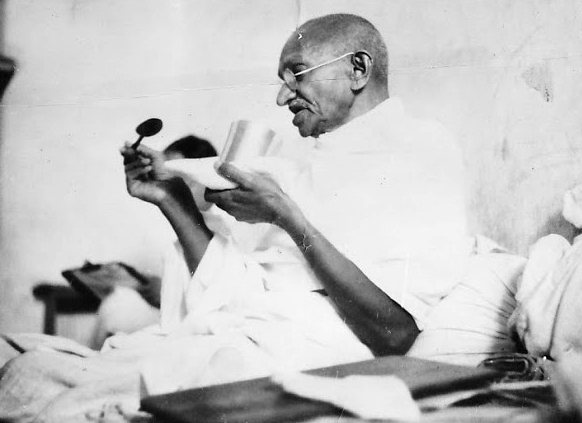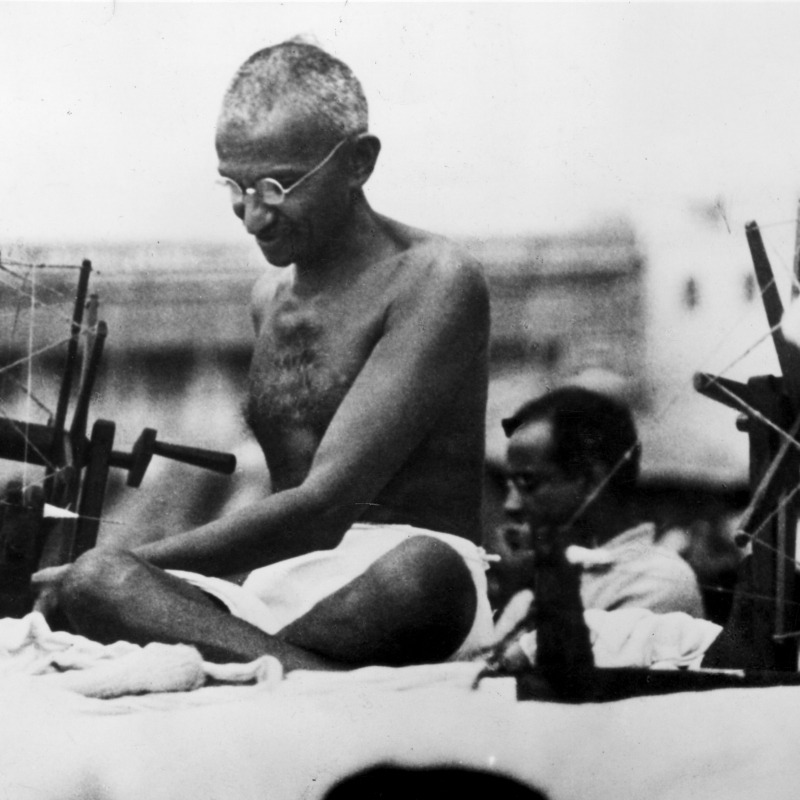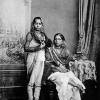As we discuss the relevance of Gandhi’s understanding of Hinduism in modern India, we examine just how he accepted and interpreted the Hindu religious and cultural tradition in his own lifetime, both building upon what his forebears had cumulatively contributed over time but also differing from this in some significant ways. (Photo courtesy: Wikimedia Commons)
At a time when the birthplace of Rama has been officially determined and a grand temple to commemorate the historical Rama in keeping with the Hindu religious ‘faith’ or sentiment met with approval, it is pointless to ask what Gandhi might have thought of this issue. For the Mahatma,[1] both Rama and Krishna were exemplars and embodiments of human virtue, not figures from history. Arguably, therefore, Lord Rama cannot be confined to a designated space nor limited to some anthropomorphic form, though that too had its uses. His God, on the contrary, permeated the entire universe, marking His presence on every single object whether animate or inanimate. He claimed to have found this idea in the opening lines of the Isa Upanishad,[2] which he took to substantively define and delineate the true Hindu spirit, the spirit that stood outside and independent of ritual conformity in everyday life, habitual visits to the temple or commonplace devotion shown to a Higher Being. An avatar, he defined, descended on earth not as God but some extraordinary human figure which had greatly benefited humanity through their thought and deeds.
Such idiosyncratic views, as is only too well known, brought upon him the ire of the orthodox Savarna Hindu community and the marginalised Dalits alike. The first group argued that the Mahatma had brazenly violated certain basic rules governing the Hindu’s social and religious life; the second was led to believe that he had quite manipulatively produced only cosmetic changes to the religious and social fabric of Hinduism without any meaningful structural or ideological changes.
Related | Mahatma Gandhi’s 'Hind Swaraj': Imagining a Nation
Gandhi’s understanding of Hinduism may have little relevance today in an environment defined by a burgeoning Hindutva and widening ruptures. But it might still be interesting to examine just how he accepted and interpreted the Hindu religious and cultural tradition in his own lifetime, both building upon what his forebears had cumulatively contributed over time but also differing from this in some significant ways. The Mahatma combined in his person the zeal of the modernist reformer but also a sense of restraint which helped him to remain rooted in his own tradition. This at once situates him within the history of Hindu self-understanding in colonial India and its several underlying ambiguities.
Allowing for certain differences, Gandhi consciously inherited and further developed three major postulates within colonial Hinduism. For one, he accepted the notion, first articulated by Rammohun Roy in modern times, that colonial Hinduism, a category widely accepted today, governed the Hindu’s life in totality, and that no effective distinction could really be made between sacred and the profane, the secular and the religious. Implicitly, this also carried the idea that ultimately the worth of religions had to be measured in terms of practical utility. This calls to mind Swami Vivekananda’s introducing the concept of ‘Practical Vedanta’ in his London lectures (1896).
Also read | 'Gandhi will not provide straight answers', says Dr Tridip Suhrud
Second, he amplified and lent greater sophistication to the idea that God and religion represented a unity of faith but variety in descriptions or expressions. This, he then combined with an ecumenism[3] attitude that accommodated both image worship and the abstract adoration of an Inscrutable Absolute. His philosophical preferences were on the side of Vedantic non-dualism (advaita), which spoke of an Impersonal God shorn of all humanly cognisable qualities, and yet believed in the value of prayers, which, ipso facto, postulated the existence of a personal God. Third, like some Hindu thinkers before him, he actively joined the idea of religious praxis to committed social service. Like them, he did not believe that ethics could be made subservient to religion as was indeed the traditional Hindu view.

Hinduism and Politics
Unlike present-day ‘secularists’, Gandhi readily joined religion to politics even when fully aware of the dangers incipient in this strategy. Unlike them again, he did not believe that for the Hindu to follow the secular path meant either turning sufficiently non-Hindu or un-Hindu so as to better accommodate rival or differing faiths. His preference, rather, was for adopting a dialogic intellectual and cultural framework which allowed each tradition to draw upon the strengths of another. This was consistent with his view that each religion represented, whether historically or doctrinally, some unique quality or ethos worthy of emulation. Thus, there was the power of love in Christianity; strict monotheism in Islam; the cosmic unity of all life in Hinduism; karuna or compassion of Buddhism; and the many-sidedness of Reality in Jainism. That God was the common source of all religions had been articulated before him but without the dialogic possibility. Experiments introduced into ashram life by Gandhi included common prayer meetings and common observance of religious festivals. Sri Ramakrishna’s panacea, by contrast, had been to accept various religious traditions in their entirety and not selectively.
Also read | छत्तीसगढ़ में गांधीजी
Rev. Joseph J. Doke, Gandhi’s first biographer, noted that Gandhi’s religious sympathies were at one stage so wide that they failed to accept or understand sectarian claims. This is reminiscent of Vivekananda’s words at Chicago: ‘We believe not only in universal toleration but we accept all religions as true.’[4] Like both Ramakrishna and Vivekananda before him, Gandhi took exception to the use of the word ‘tolerance’: for him this was some ‘gratuitous assumption’ whereby someone who believed his religion to be superior patronisingly continued to ‘tolerate’ those in error.
Gandhi, A Sanatani Hindu
When applying his mind to Hindu scriptures, Gandhi adopted the selective approach of Roy, which did not confuse the part for the whole and reserved the right to hermeneutic freedom. Though situating himself within the orthodox tradition of Acharya Sankara, Roy believed that both women and Shudras were entitled to the shruti, or the Hindu canon. This radicalism finds its apt parallel in Gandhi’s campaign against untouchability that greatly angered and antagonised the Savarna Hindus. The Mahatma called himself a Sanatani Hindu, by which, of course, he did not mean a Hinduism frozen in time. ‘Sanatan Hindudharma’ was not a religion unto itself but a way of looking at the nature and functions of religion. Gandhi’s views on Hinduism were not without their inconsistencies, of which we may locate several examples if only we looked. On the other hand, its abiding quality was that it took religion not as some fixed doctrine but as aspiring for a certain quality of life. For both Vivekananda and Gandhi, religion at its core was an enduring and deeply personal experience (anubhava) which we were all bound to gather in the process of working out our earthly lives.
This article was also published on Scroll.
Notes
[1] All references to Gandhi’s thoughts on religion are drawn from the following handy and useful collections: M.K. Gandhi, My Religion. Compiled and edited by Bharatan Kumarappa (Ahmedabad: Navajiban Publishing House, 1955); M.K. Gandhi, Hinduism according to Gandhi: Through Writings and Critical Interpretations, (ed.) Radhisu M. (Delhi: Orient Publishers, 2014).
[2] The opening line runs as the following: ‘Isavasmidam sarvam yatkichya jagatyam jagat’, meaning ‘the spirit of God fills the entire universe’.
[3] The principle or aim of promoting unity among the world's Christian churches.
[4] The Complete Works of Vivekananda: Mayavati Memorial Edition, Vol. 1 (Kolkata: Advaita Ashrama, 1972), 5.












